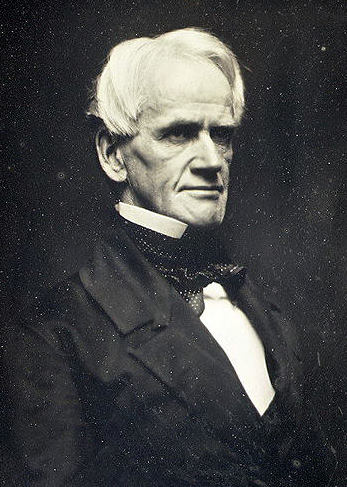"A house without books is like a room without windows. No man has a right to bring up children without surrounding them with books...Children learn to read being in the presence of books." (Horace Mann)
Horace Mann had a total of six weeks of schooling between the ages of 10 and 20. Yet, as an adult, he became a successful lawyer, politician, abolitionist and educational reformer. How did he do it? He visited the town library.
Horace Mann, the son of a Yankee farmer, was born into poverty in 1796. His health suffered as he had to endure hard manual labour. His education suffered as well. It was only through the town library, the nation's first public library, founded by Benjamin Franklin, that Horace was exposed to literature.
Somehow, Horace prepared himself for the entrance exam which he passed and was accepted at Brown University. He continued his studies at Litchfield Law School and passed the Norfolk County Bar exam to become a lawyer.
In 1827, Horace was elected to the Massachusetts House of Representatives, a position which he held for several years, along with the Massachusetts State Senate. In 1837, Horace was appointed the secretary of the Massachusetts Board of Education, a position that he took on with passion. He set out to visit every school in the state and see what changes needed to made to improve the system. He planned the common school system, the original teacher's colleges. He founded and contributed to the Common School Journal. In 1843, Horace visited Prussia to study their successful educational system and returned to Massachusetts to implement their ideas.
Horace believed strongly in the following reforms: more school houses, better equipped school houses, longer schooling (up to 16 years of age), higher paid teachers and a wider curriculum. Horace believed not only in promoting the academic subjects but also building the character of each student and the inculcation of Christian values. He encouraged obedience to authority and promptness in attendance to prepare each student for the working world.
Horace Mann, who is known as "The Father of American Education" today, also believed strongly in education at home. "A house without books is like a room without windows. No man has a right to bring up children without surrounding them with books...Children learn to read being in the presence of books."

Horace Mann, Father of American Public Education, courtesy https://en.wikipedia.org/wiki/Horace_Mann.
Handling multiple subjects, tight deadlines, and complex university tasks can be overwhelming. This service provides expert-written solutions, detailed explanations, and well-researched content for all academic levels. Whether it’s essays, case studies, reports, or technical projects, you get personalised guidance that meets university standards. At the midpoint of your academic journey, their university assignment help ensures you stay organised, confident, and fully supported. With 24/7 assistance, timely delivery, and plagiarism-free work, students can rely on this platform for consistent high scores. Visit the link now to simplify your workload effectively.
ReplyDelete